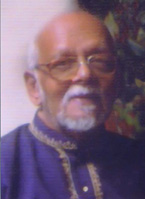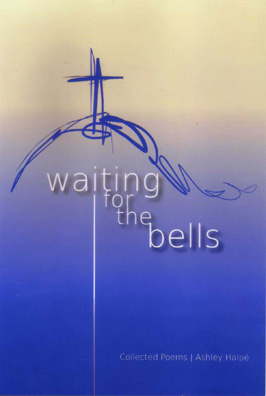Ashley Halpé, a doyen of our time
Waiting for the Bells Printed by M.D. Gunasena and
Co.,
Reviewed by Gwen Herat
Bones do not dream not these, anyway these hold their rigorous
postures clenched in the perfect scream of measureless silence
(A dream of bones – page 72)
I do not understand what reference the cover has with the 285 pages
in the book but I do understand its magnificence. It looks like a
free-hand sketch of the dome of St. Peter in the Vatican with a cross
upon it. It is a double-line sketch sitting pretty upon royal-blue and
blushing cream.
|

Prof. Ashley Halpé |
The elegant design by Guy Halpé obviously bestowed by the
extraordinary talents of his gifted parents, opens out to the corridors
of the edition. Everyone will reach for it upon eye-contact.
He is the master of the living and through his spirit, immortals
speak and the message makes one weep as well as laugh because he is the
instrument of the Muse that makes the world dance and spin words.
That is Prof. Ashley Halpé and my ‘guru’ which makes me ask myself,
‘who am I to review his book? Yet, the urge rises above reasoning.
Freedom
During the latter part of the last century, an increased freedom
given to writers to employ lyrical lines and incorporate a greater
variety of expression, resulted in many countries producing writers and
poets of high esteem that was not experienced in the modern world and
schools of robust thinking.
They passed through its style and learnt all wider points of English
compass. Not surprisingly, their minds were developed towards great
classical works. From this background, emerged Sri Lanka's much revered
Prof. Ashley Halpé.
He was one who had the courage to retain his own distinctive style as
a writer and poet. His writings are warm and passionate and immovable
once set on paper.
A way I can describe his works is set upon the first eight notes
(though I am a lousy pianist) when his pen strikes hard at them.
Incidentally, some of his short works can be set to music on strings. As
a child I had been fascinated by a song from Shakespeare's Tempest set
to music ‘Where the Beesucks there suck I'...... This is how I see
Halpe's stanzas.
Waiting for the Bells is a surprising departure from his serious
writing to lyrical ecstasy in a wonderful adventure and for the
professor whose child within him sings aloud.
This is what Shakespeare said that we all have a child in us and
Halpé is a Shakespearean authority like Dr. Levi Fox of the Shakespeare
Centre whose books are widely read and preserved around the world.
Iago, Desdemona, are both forgotten
The splendid fatuity
Of this assumption of prelapsarian dignity
Ages watching world, rebukes
The offending gods.
The bright sword finds at last its perfect sheathe. (Othello – page 174)
Alternatives
Despite numerous alternatives achieved by other writers of the day,
Halpé remains the only version generally known for his positive handlung
of words into sentences or lyrics into poetry.
But Halpé is no Wordsworth or Shakespeare and neither a Tagore closer
to home. He needs no comparison and stands tall in his language
contribution no matter whether it is academy or in writing.
Halpe is a patient writer, very calculating as seen in Waiting for
the Bells.
Every page follows another in a happy trail, ever lapping each other.
 There is much to be extracted from between the lines and of course a
pleasure once this mission is completed. Perhaps one ends up reading
this edition of poetry differently to what has been imagined after
browsing through a few pages. There is much to be extracted from between the lines and of course a
pleasure once this mission is completed. Perhaps one ends up reading
this edition of poetry differently to what has been imagined after
browsing through a few pages.
The feeling of being dragged into deeper comprehension is what
matters to those who wish to probe the word-study. Student and teacher;
reader and researcher will find unlimited depths as they move on.
And how many literary giants can throw challenges at him? None I feel
could reach a striking distance to this icon.
This poetry book is not loaded with his spectacular writing as found
in his other works but heart-warming enough to be relished by the young
and not-so-young. The youthful anecdotes and the non-rhyming lines,
prose in their essence and blistering stanzas make the collection
alluring enough to stay permanent in any library.
It gives the impression of a coffee-table book to be displayed to
reach every hand.
‘The smell of all our Aprils hangs upon
cool jacaranda and lucent flamboyant
each annual recession hurries on
day of the hawk and hour of the ant
If were rock
If I were island
..Jacaranda and lucent flamboyant
Forever bear the stain of wasted blood
bones whitened by the relentless ant
smell still of slaughter, fire and mud
to be rock
or island.... (‘All our Aprils -page 36)
Mountain
This is certainly not what the mountain told the poet (in Shelley's
Mont Blac). Here, we find Halpé using his signature language that we all
are familiar with and appeal to his readers (and to me during my college
lessons).
He is a practical writer of the literati whose minds he mesmerise
into force of command.
We all accept what he invents and never question authority because he
is the beginning and end of modern English in our country. Waiting for
the Bells has been penned over a time into a collection of poetry.
His lifetime ardour for his beloved art is one of increasing power
and influence. Halpé is also shrewd when words demand and knows when to
be obsequious or even flatter. Arguably the most naturally gifted writer
of our time, I am not sure whether he would have been a child prodigy
otherwise how would he have reached such heights?
Having produced some of our country's cream of literati, guided a
chip of a girl like me to the writer I am today, added Mass (Gloria,
Credo, Sanctus and Benedictus)to the Sermons of an extraordinary Bishop
and also made the rocks sing. These are some of Halpe's tiny
achievements.
I see so much musicality and over-flowing rhythm in words. It is a
worthy tribute to a great man.
Genius
Ashley Halpé is a soft-spoken, diminutive genius who had his early
education at De Mazenod College and St. Peter's College.
Thereafter, he went over to University of Ceylon (Peradeniya) and
ended up at the University of Bristol, England.
He has been vested with many laurels among which are Kalakeerthi,
Vishvaprasadini, Sahitharatna and Chevalier dans I'ordre des Palmes
Academique. Aesthetics too had been his forte; in the theatre and
directors, set designer and performer.
A member of the 43 Group, as an artist, he exhibited in Colombo,
Kandy and Peradeniya, as well as in London, Bristol and San Paolo
Biennale.
Halpe has edited and published many journals, books and anthologies.
He is a popular reviewer and translator, especially the works of Martin
Wickremasinghe.
He draws his inspiration from his wife, Brigette who is a reputed
pianist and classical music teacher/educator. Two daughters, Hashini and
Apsara are talented violinists and held in their mother's school of
music beside performing. |

